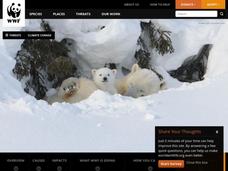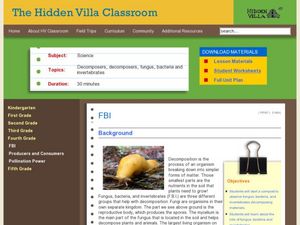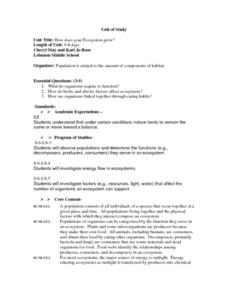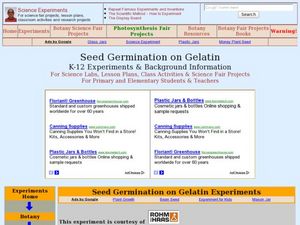University of Kentucky
Beneficial Bug Scavenger Hunt
Many people think of bugs as annoying pests to be squashed, but most insects and spiders are beneficial, eating the actual pests or pollinating plants. After reviewing some of the common bugs in your area (they may differ from those...
American Museum of Natural History
Gusty: The Gut Microbiome Card Game
Build up your gut. Groups up to four play a card game to learn more about the microbiome in the gut. Learners try to build a healthy gut with their cards. The player acquiring six microbes without any pathogens wins the game.
Curated OER
Climate Change And Disease
Students consider the role of climate change in the occurrence of vector born diseases such as malaria. In small groups, they research a specific vector to complete an information chart on climate changes in the region where the vector...
Teach Engineering
Clean it Up!
Harness the power of bacteria. Scholars see how using organisms that exist in nature can help solve human problems in the process known as bioremediation. They research and discuss several successful examples, such as using oil-eating...
Curated OER
FBI
Fourth graders experiment with compost. In this Science lesson, 4th graders begin a worm compost as well as an outdoor compost. Students discuss decomposition.
California Academy of Science
Composting: A Scientific Investigation: California Academy of Sciences
Garbage, recycle, compost: Does it really matter where we put our trash once we are done? By making detailed observations over seven weeks, kids will see which materials break down naturally to become a healthy part of the soil, and...
Curated OER
The good microbes
The question posed for the class to consider; What would decay and what would not? They read the short passage on decomposition and microbes, then mark the items that would decay after a two-week period. A scientific investigation idea...
Curated OER
Dependence and Interdependence
Third graders explore the dependence and interdependence that plants and animals in every environment have on one another. They examine how plants and animals depend on each other for survival. Students complete a variety of experiments...
Curated OER
De"compost"ition
Students develop an understanding of the decomposition process and the parameters which influence the rate at which it occurs.
Curated OER
Meat Processing
In this meat processing worksheet, students learn how nitrates are used as curing agents for meat and how tenderizers work. Students compare meat treated with nitrates with meat that has not been treated. Students complete 8 short answer...
Curated OER
Dinosaurs 1: Where Are the Dinosaurs?
Students explore the time of the dinosaurs. In this extinction lesson, students watch a video clip about different dinosaurs and are asked about what they observed. Students talk about how dinosaurs hatched from eggs and compare that...
Curated OER
Nature's Recycling Program
Students identify what materials make up compost. In this science of recycling lesson, students explain the benefits of composting determine how compost is a good plant fertilizer.
Curated OER
Pond Life
Students explore pond ecosystems. In this living environment lesson, students observe the local pond and identify the living things they find by drawing pictures. Students observe organisms that were found in the pond by using a...
Curated OER
Milk: A Practical Application
Explain the coagulation and coalescence processes associated with milk protein and cheese. List the components of milk and explain how each component is dispersed in the milk. Describe what happens when milk protein is coagulated Discuss...
Curated OER
How Does Your Ecosystem Grow?
Students consider that under certain conditions in nature tend to remain the same or move toward a balance. They observe populations and determine the functions (e.g., de-composers, producers, consumers) they serve in an ecosystem. They...
Curated OER
Explore: 5th Grade Dissolved Oxygen
Fifth graders, in groups, use basic science process skills to measure and compare the dissolved oxygen levels and pH levels of distilled, stream, and pond water.
Curated OER
Bioplastics
Students define bioplastics and identify its uses. For this bioplastics lesson, students compare and contrast styrofoam to starch peanuts after careful examination. Students understand what biodegradeable means.
Curated OER
Word Scramble – Lesson 3
In this health worksheet, students identify and define vocabulary terms related to foodborne illness. They unscramble the words listed at the bottom of the sheet and use them to complete each of 8 blanks.
Curated OER
Major Organic Acids in Fruits
Students investigate the organic acids present in a variety of juices. In this organic acids lesson plan, students read about the effects of organic acids in juices. They use paper chromatography to separate out the acids present in a...
Curated OER
What Are the Layers of the Rain Forest?
Young scholars investigate the different levels of the rain forest by comparing it to an apartment. In this ecology lesson, students practice using forest related vocabulary words and complete a vocabulary data sheet. Young scholars...
Curated OER
From Wolf to Dog
Students explain how dogs evolved from wolves based on the video. In this biology lesson, students research about breeding animals for specific traits. They interview dog owners and create a presentation about the dog.
Curated OER
Seed Germination on Gelatin
Students examine how seeds germinate in a culture. In this germination lesson students germinate seeds in gelatin and observe the growth of the plant.
Curated OER
Sorting
Students study how things are stored and how information is retrieved. In this investigative lesson students play a game that helps them to see how things are sorted in a library.
Curated OER
Hand Washing: I can handle it!
Students wash cinnamon off of their hands in a variety of ways to learn proper ways to disinfect. In this washing hands lesson plan, students use water, soap, cooking spray, and other ingredients to wash hands and talk about the results.

























